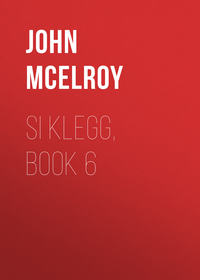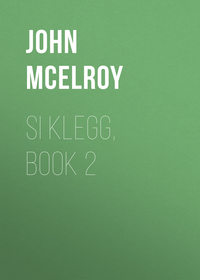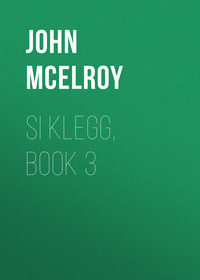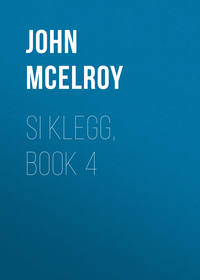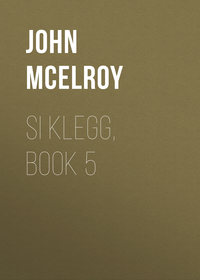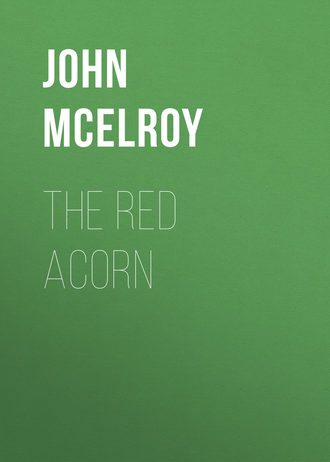 полная версия
полная версияThe Red Acorn
“The sooner it comes the better,” said Harry firmly. “It has to be sometime, and I’m getting very anxious for an end to this eternal marching and countermarching.”
“My winsome little feet,” Kent Edwards put in plaintively, “are knobby as a burglar-proof safe, with corns and bunions, all of them more tender than a maiden’s heart, and painful as a mistake in a poker hand. They’re the ripe fruit of the thousands of miles of side hills I’ve had to tramp over because of Mr. Bragg’s retiring disposition. Now, if he’s got the spirit of a man he’ll come out from under the bed and fight me.”
“O, he’ll come out—he’ll come out—never you fear,” said Abe, sardonic as usual. “He’s got a day or two’s leisure now to attend to this business. A hundred thousand of him will come out. They’ll swarm out o’ them cedar thickets there like grass-hoppers out of a timothy field.”
“Boys,” said Harry, returning after a few minutes’ absence, “the Colonel says we’ll go into camp right here, just as we stand. Kent, I’ll take the canteens and hunt up water, if you and Abe will break some cedar boughs for the bed, and get the wood to cook supper with.”
“All right,” responded Kent, “I’ll go after the boughs.”
“That puts me in for the wood,” grumbled Abe. “And, I don’t suppose there’s a fence inside of a mile, and if there is there’s not a popular rail in it.”
“And, Doctor,” continued Harry, flinging the canteens over his shoulder, “you’ll stay and take a cup of coffee and sleep with us to-night, won’t you? The trains are all far behind, and the hospital wagon must be miles away.”
“Seems to me that I’ve heard something of the impropriety of visiting your friends just about mealtime,” said the Doctor quizzically, “but a cup of coffee just now has more charms for me than rigid etiquette, so I’ll thankfully accept your kind invitation. Some day I’ll reciprocate with liberality in doses of quinine.”
In less time than that taken by well-appointed kitchens to furnish “Hot Meals to Order” the four were sitting on their blankets around a comfortable fire of rails and cedar logs, eating hard bread and broiled fat pork, and drinking strong black coffee, which the magic of the open air had transmuted into delightfully delicate and relishable viands.
“You are indebted to me,” said Dr. Denslow, as he finished the last crumb and drop of his portion of the food, “for the accession to your company at this needful time, of a tower of strength in the person of Lieutenant Jacob Alspaugh.”
Abe groaned; the Doctor looked at him with well-feigned astonishment, and continued:
“That gore-hungry patriot, as you know, has been home several months on recruiting duty, by virtue of a certificate which he wheedled out of old Moxon. At last, when he couldn’t keep away any longer, he started back, but he carefully restrained his natural impetuosity in rushing to the tented field, and his journey from Sardis to Nashville was a fine specimen of easy deliberation. There was not a sign of ungentlemanly hurry in any part of it. He came into my ward at Nashville with violent symptoms of a half-dozen speedily fatal diseases. I was cruel enough to see a coincidence in this attack and the general marching orders, and I prescribed for his ailments a thorough course of open air exercise. To be sure that my prescription would be taken I had the Provost-Marshal interest himself in my patient’s case, and the result was that Alspaugh joined the regiment, and so far has found it difficult to get away from it. It’s the unexpected that happens, the French say, and there is a bare possibility that he may do the country some service by the accidental discharge of his duty.”
“The possibility is too remote to waste time considering,” said Harry.
They lay down together upon a bed made by spreading their overcoats and blankets upon the springy cedar boughts, and all but Harry were soon fast asleep. Though fully as weary as they he could not sleep for hours. He was dominated by a feeling that a crisis in his fate was at hand, and as he lay and looked at the stars every possible shape that that fate could take drifted across his mind, even as the endlessly-varying cloud-shapes swept—now languidly, now hurriedly—across the domed sky above him. And as the moon and the stars shone through or around each of the clouds, making the lighter ones masses of translucent glory, and gilding the edges of even the blackest with silvery promise, so the thoughts of Rachel Bond suffused with some brightness every possible happening to him. If he achieved anything the achievement would have for its chief value that it won her commendation; if he fell, the blackness of death would be gilded by her knowledge that he died a brave man’s death for her sweet sake.
He listened awhile to the mournful whinny of the mules; to the sound of artillery rolling up the resonant pike; to the crashing of newly-arrived regiments through the cedars as they made their camps in line-of-battle; to little spurts of firing between the nervous pickets, and at last fell asleep to dream that he was returning to Sardis, maimed but honor-crowned, to claim Rachel as his exultant bride.
The Christmas forenoon was quite well-advanced before the fatigue of Rachel Bond’s long ride was sufficiently abated to allow her to awaken. Then a soft hum of voices impressed itself upon her drowsy senses, and she opened her eyes with the idea that there were several persons in the room engaged in conversation. But she saw that there was only Aunt Debby, seated in a low rocking-chair by the lazily burning fire, and reading aloud from a large Bible that lay open upon her knees. The reading was slow and difficult, as of one but little used to it, and many of the longer words were patiently spelled out. But this labored picking the way along the rugged path of knowledge, stumbling and halting at the nouns, and verbs, and surmounting the polysyllables a letter at a time, seemed to give the reader a deeper feeling of the value and meaning of each word, than is usually gained by the more facile scholar. As Rachel listened she became aware that Aunt Debby was reading that wonderful twelfth chapter of St. Luke, richest of all chapters in hopes and promises and loving counsel for the lowly and oppressed. She had reached the thirty-fifth verse, and read onward with a passionate earnestness and understanding that made every word have a new revelation to Rachel:
“Let your loins be girded up, and your lights burning; “And ye yourselves like unto men that wait for their Lord when he will return from the wedding; that when he cometh and knocketh they may open unto him immediately. “Blessed are those servants whom the Lord when he cometh shall find watching; verily I say unto you that he shall gird himself and make them to sit down to meat, and will come forth and serve them. “And if ye shall come in the second watch, or come in the third watch, and shall find them so, blessed are those servants. “And this now that if the good man of the house had known what the hour the thief would come he would have watched, and not suffered his house to be broken through. “Be ye therefore ready also, for the Son of Man cometh at an hour when ye think not.”Rachel stirred a little, and Aunt Debby looked up and closed the book.
“I’m afeared I’ve roused ye up too soon,” she said, coming toward the bed with a look of real concern upon her sad, sweet face. “I raylly didn’t intend ter. I jest opened the book ter read teh promise ‘bout our Father heedin’ even a sparrer’s fall, an’ forgot ‘bout our Father heedin’ even a sparrer’s fall, an’ forgot, an’ read on; an’ when I read, I must read out loud, ter git the good of hit. Some folks pretend they kin understand jest ez well when they read ter themselves. Mebbe they kin.”
“O, no,” replied Rachel cheerfully, “you didn’t disturb me in the least. It was time that I got up, and I was glad to hear you read. I’m only troubled with the fear that I’ve overslept myself, and missed the duty that I was intended for.”
“Make yourself easy on that ‘ere score. Ye’ll not be needed to-day, nor likely to-morrow. Some things hev come up ter change Jim’s plans.”
“I am very sorry,” said Rachel, sitting up in the bed and tossing back her long, silken mane with a single quick, masterful motion. “I wished to go immediately about what I am expected to do. I can do anything better than wait.”
Aunt Debby came impulsively to the bedside, threw an arm around Rachel’s neck, and kissed her on the forehead. “I love ye, honey,” she said with admiring tenderness. “Ye’ ‘re sich ez all women orter be. Ye ‘ll make heroes of yer husband and sons. Ye ‘ve yit ter l’arn though, thet the most of a woman’s life, an’ the hardest part of hit, is ter wait.”
In her fervid state of mind Rachel responded electrically to this loving advance, made at the moment of all others when she felt most in need of sympathy and love. She put her strong arms around Aunt Debby, and held her for a moment close to her heart. From that moment the two women became of one accord. Womanlike, they sought relief from their high tension in light, irrelevant talk and care for the trifling details of their surroundings. Aunt Debby brought water and towels for Rachel’s toilet, and fluttered around her, solicitous, helpful and motherly, and Rachel, weary of long companionship with men, delighted in the restfulness of association once more with a gentle, sweet-minded woman.
The heavy riding-habit was entirely too cumbersome for indoor wear, and Rachel put on instead one of Aunt Debby’s “linsey” gowns, that hung from a peg, and laughed at the prim, demure mountain girl she saw in the glass. After a good breakfast had still farther raised her spirits she ventured upon a little pleasantry about the dramatic possibilities of a young lady who could assume different characters with such facility.
The day passed quietly, with Rachel studying such of the Christmas festivities as were visible from the window, and from time to time exchanging personal history with Aunt Debby. She learned that the latter had left her home in Rockcastle Mountains with the Union Army in the previous Spring, and gone on to Chattanooga, to assist her nephew, Fortner, in obtaining the required information when Mitchell’s army advanced against that place in the Summer. When the army retreated to the Ohio, in September, she had come as far back as Murfreesboro, and there stopped to await the army’s return, which she was confident would not be long delayed.
“How brave and devoted you have been,” said Rachel warmly, as Aunt Debby concluded her modestly-told story. “No man could have done better.”
“No, honey,” replied the elder woman, with her wan face coloring faintly, “I’ve done nothin’ but my plain duty, ez I seed hit. I’ve done nothin’ ter what THEY would’ve done had n’t they been taken from me afore they had a chance. Like one who speaks ter us in the Book, I’ve been in journeyin’s often, in peril of robbers, in perils of mine own countrymen, in perils in the city, in perils in the wilderness, in weariness an’ painfulness, in watchings often, in hunger an’ thirst, in fastings often, in cold an’ nakedness, but he warns us not ter glory in these things, but in those which consarn our infirmities.”
“How great should be your reward!”
“Don’t speak of reward. I only want my freedom when I’ve ‘arned hit—the freedom ter leave an ‘arth on which I’ve been left behind, an’ go whar my husband an’ son are waitin’ fur me.”
She rose and paced the floor, with her face and eyes shining.
“Have you no fear of death whatever?” asked Rachel in amazement.
“Fear of death! Child, why should I fear death? Why should I fear death, more than the unborn child fears birth? Both are the same. Hit can’t be fur ter thet other world whar THEY wait fur me. Hit is not even ez a journey ter the next town—hit’s only one little step though the curtain o’ green grass an’ violets on a sunny hillside—only one little step.”
She turned abruptly, and going back to her chair by the fireside, seated herself in it, and clasping her knees with her hands, rocked back and forth, and sang in a low, sweet croon:
“Oh, the rapturous, transporting scene, That rises ter my sight; Sweet fields arrayed in livin’ green, An’ rivers of delight. “All o’er those wide, extended plains Shines one eternal day; Thar God, the Son, forever reigns, An scatters night away. “No chillin’ winds or poisonous breath Kin reach thet healthful shore; Sickness an’ sorrow, pain an’ death, Are felt an’ feared no more.”After dark Fortner came in. Both women studied his face eagerly as he walked up to the fire.
“Nothin’ yet, honey,” he said to Aunt Debby, and “Nothin’ yet, Miss,” to Rachel, and after a little stay went out.
When Rachel awoke the next morning the sky was lowering darkly. On going to the window she found a most depressing change from the scene of bright merriment she had studied the night before. A chill Winter rain was falling with dreary persistence, pattering on the dead leaves that covered the ground, and soaking into the sodden earth. A few forlorn little birds hopped wearily about, searching in vain in the dry husks and empty insect shells for the food that had once been so plentiful there. Up and down the streets, as far as she could see, men in squads or singly, under officers or without organization, plodded along dejectedly, taking the cold drench from above, and the clinging mud around their feet, with the dumb, stolid discontent characteristic of seasoned veterans. When mules and horses went by they seemed poor and shrunken. They drew their limbs and bodies together, as if to present the least surface to the inclement showers, and their labored, toilsome motion contrasted painfully with their strong, free movement on brighter days. Everything and everybody in sight added something to increase the dismalness of the view, and as Rachel continued to gaze upon it the “horrors” took possession of her. She began to brood wretchedly over her position as a spy inside the enemy’s lines, and upon all the consequences of that position.
It was late that night when Fortner came in. As he entered the two expectant women saw, by the ruddy light of the fire, that his face was set and his eyes flashing. He hung his dripping hat on a peg in the chimney, and kicked the blazing logs with his wet boots until a flood of meteor sparks flew up the throat of the fireplace. Turning, he said, without waiting to be questioned:
“Well, the hunt’s begun at last. Our folks came out’n Nashville this morning in three big armies, marchin’ on different roads, an they begun slashin’ at the Rebels wherever they could find ‘em. Thar’s been fouten at Triune an’ Lavergne, an’ all along the line. They histed the Rebels out’n ther holes everywhar, an’ druv’ em back on the jump. Wagon load arter wagon load o’ wounded’s comin’ back. I come in ahead of a long train agwine ter the hospital. Hark! ye kin heah ‘em now.”
The women listened.
They heard the ceaseless patter and swish of the gloomy rain—the gusty sighs of the wind through the shade-trees’ naked branches—louder still the rolling of heavy wheels over the rough streets; and all these were torn and rent by the shrieks of men in agony.
“Poor fellows,” said Rachel, “how they are suffering!”
“Think ruther,” said Aunt Debby calmly, “of how they’ve made others suffer. Hit’s God’s judgement on ‘em.”
Rachel turned to Fortner. “What will come next? Will this end it? Will the Rebels fall back and leave this place?”
“Hardly. This’s on’y like the fust slap in the face in a fight atween two big savage men, who’ve locked horns ter see which is the best man. Hit’s on’y a sorter limberin’ the jints fur the death rassel.”
“Yes; and what next?”
“Well, Rosy’s started fur this ‘ere place, an’ he’s bound ter come heah. Bragg’s bound he sha’n’t come heah, an’ is gittin’ his men back to defend the town.”
“What am I—what are we to do in the meanwhile?”
“Ye’re ter do nothin’, on’y stay in the house ez close ez ye kin, an’ wait tell the chance comes ter use ye. Hit may be ter-morrer, an’ hit mayn’t be fur some days. These army moves are mouty unsartin. Aunt Debby ‘ll take keer on ye, an’ ye ‘ll not be in a mite o’ danger.”
“But we’ll see you frequently?”
“Ez offen ez I kin arrange hit. I’m actin’ ez orderly an’ messenger ‘bout headquarters, but I’ll come ter ye whenever I kin git a chance, an’ keep ye posted.”
This was Friday night. All day Saturday, as long as the light lasted, Rachel stood at the window and watched with sinking heart the steady inflow of the Rebels from the north. That night she and Aunt Debby waited till midnight for Fortner, but he did not come. All day Sunday she stood at her post, and watched the unabated pouring-in on the Nashville pike. Fortner did not come that night. She was downcast, but no shade disturbed the serenity of Aunt Debby’s sweet hymning. So it was again on Monday and Tuesday. The continually-swarming multitudes weighed down her spirits like a millstone. She seemed to be encompassed by millions of armed enemies. They appeared more plentiful than the trees, or the rocks, or the leaves even. They filled the streets of the little town until it seemed impossible for another one to find standing room. Their cavalry blackened the faces of the long ranges of hills. Their artillery and wagons streamed along the roads in a never-ending train. Their camp-fires lighted up the country at night for miles, in all directions.
Just at dusk Tuesday night Fortner came in, and was warmly welcomed.
“There are such countless hosts of the Rebels,” Rachel said to him after the first greetings were over, “that I quite despair of our men being able to do anything with them. It seems impossible that there can be gathered together anywhere else in the world as many men as they have.”
“I don’t wonder ye think so, but ef ye’d been whar I wuz to-day ye’d think thet all the world wuz marchin’ round in blue uniforms. Over heah hit seems ez ef all the cedars on the hills hed suddintly turned inter Rebel soldiers. Three miles from heah the blue-coats are swarmin’ thicker’n bees in a field o’ buckwheat.”
“Three miles from here! Is our army within three miles of here?”
“Hit sartinly is, an’ the Lord-awfullest crowd o’ men an’ guns an’ hosses thet ever tromped down the grass o’ this ere airth. Why, hit jest dazed my eyes ter look at ‘em. Come ter this other winder. D’ ye see thet furtherest line o’ campfires, ‘way on yander hill? Well, them’s Union. Ef ye could see far enuf ye’d see they’re ‘bout five miles long, an’ they look purtier’n the stars in heaven.”
“But if they are so close the battle will begin immediately, will it not?”
“Hit ain’t likely ter be put off very long, but thar’s no tellin’ what’ll happen in war, or when.”
“When is my time to come?”
“Thet’s what I’ve come furt ter tell ye. Ef we’re agwine ter be of sarvice ter the Guv’MENT, we must do hit to-night, fur most likely the battle’ll begin in the mornin’. Hit’s not jest the way I intended ter make use of ye, but hit can’t be helped now. I hev information thet must reach Gineral Rosencrans afore daybreak. The vict’ry may depend on hit. Ter make sure all on us must start with hit, fur gittin’ through the lines is now mouty dangersome, an’ somebody—mebbe several—is bound to git cotcht, mebbe wuss. The men I expected ter help me are all gone. I hain’t nobody now but ye an Aunt Debby. D’ye dar try an’ make yer way through the lines to-night?”
Rachel thought a minute upon the dreadful possibilities of the venture, and then replied firmly:
“Yes I dare. I will try anything that the rest of you will attempt.”
“Good. I knowed ye’d talk thet-a-way. Now we must waste no time in gittin’ started, fur God on’y knows what diffikilties we’ll meet on the way, an’ Rosencrans can’t hev the information enny too soon. Ev’ry minute hit’s kep’ away from him’ll cost many vallerable lives—mebbe help defeat the army.”
“Tell me quickly, then, what I must do, that I may lose no time in undertaking it.”
“Well, heah’s a plan of the position at sundown of the Rebels. Hit’s drawed out moughty roughly but hit’ll show jest whar they all are, an’ about the number there is at each place. Hit begins on the right, which is south of Stone River, with Breckenridge’s men; then across the river is Withers, an’ Cheatham, an’ Cleburne, with McCown’s division on the left, an’ Wharton’s cavalry on the flank. But the thing o’ most importance is thet all day long they’ve been movin’ men round ter ther left, ter fall on our right an’ crush hit. They’re hid in the cedar thickets over thar, an’ they’ll come out to-morrow mornin’ like a million yellin’ devils, an’ try ter sweep our right wing offen the face o’ the arth. D’ye understand what I’ve tole ye?”
“Yes. Breckenridge’s division is on their right, and south of Stone River. Withers, Cheatham, and Cleburne come next, on the north of the river, with McCown’s division and Wharton’s cavalry on the left, as shown in the sketch, and they are moving heavy forces around to their left, with the evident intention of falling overwhelmingly on our right early in the morning.”
“Thet’s hit. Thet’s hit. But lay all the stres ye kin on the movin’ around ter ther left. Thar’s mo’ mischief in thet than all the rest. Say thet thar’s 20,000 men gwine round thar this arternoon an’ evening’. Say thet thar’s the biggest thunder-cloud o’ danger thet enny one ever seed. Say hit over an’ over, tell everybody understands hit an’ gits ready ter meet hit. Tell hit till ye’ve made ev’ry one on ‘em understand thet thar can’t be no mistake about hit, an’ they must look out fur heeps o’ trouble on ther right. Tell hit ez ye never tole anything afore in yer life. Tell hit ez ye’d pray God Almighty fur the life o’ the one thet ye love better then all the world beside. An’ GIT THAR ter tell hit—git thru the Rebel lines—ef ye love yer God an’ yer country, an’ ye want ter see the brave men who are ter die tomorrer make their deaths count somethin’ to’ard savin’ this Union. Hit may be thet yore information’ll save the army from defeat. Hit may be—hit’s most likely—thet hit’ll save the lives o’ thousands o’ brave men who love ther lives even ez yo an’ me loves ourn.”
“Trust me to do all that a devoted woman can. I will get through before daybreak or die in the attempt. But how am I to go?”
“Hide this paper somewhar. Aunt Debby’ll fix ye up ez a country gal, while I’m gittin’ yer mar saddled an’ bridled with some common harness, instid o’ the fancy fixin’s ye hed when ye rode out heah. Ef ye’re stopt, ez ye likely will be, say that ye’ve been ter town fur the doctor, an’ some medicine fur yer sick mammy, an’ are tryin’ ter git back ter yer home on the south fork o’ Overall’s Creek. Now, go an’ git ready ez quick ez the Lord’ll let ye.”
As she heard the mare’s hoofs in front of the door, Rachel came out with a “slat-sun-bonnet” on her head, and a long, black calico riding-skirt over her linsey dress. Fortner gave her attire an approving nod. Aunt Debby followed her with a bottle. “This is the medicine ye’ve bin ter git from Dr. Thacker heah in town,” she said, handing the vial. “Remember the name, fur fear ye mout meet some one who knows the town. Dr. Thacker, who lives a little piece offen the square, an’ gives big doses of epecac fur everything, from brakebone fever ter the itch.”
“Dr. Thacker, who lives just off the square,” said Rachel. “I’ll be certain to remember.”
“Take this, too,” said Fortner, handing her a finely-finished revolver, of rather large caliber. “Don’t pull hit onless ye can’t git along without hit, an’ then make sho o’ yer man. Salt him.”
“Good-by—God bless ye,” said Aunt Debby, taking Rachel to her heart in a passionate embrace, and kissing her repeatedly. “God bless ye agin. No one ever hed more need o’ His blessin’ then we’uns will fur the next few hours. Ef He does bless us an’ our work we’ll all be safe an’ sound in Gineral Rosencrans’ tent afore noon. But ef His will’s different we’ll be by thet time whar the Rebels cease from troublin’, and the weary are at rest. I’m sure thet ef I thot the Rebels war gwine ter whip our men I’d never want ter see the sun rise ter-morrer. Good-by; we’re all in the hands o’ Him who seeth even the sparrer’s fall.”
Fortner led the mare a little ways, to where he could get a good view, and then said:
“Thet second line o’ fires which ye see over thar is our lines—them fires I mean which run up inter the woods. The fust line is the Rebels. Ye’ll go right out this road heah tell ye git outside the town, an’ then turn ter yer right an’ make fur the Stone River. Ford hit or swim your mar’ acrost, an’ make yer way thru or round the Rebel line. Ef ye find a good road, an’ everything favorable ye mout try ter make yer way strait thru ef ye kin fool the gyards with yer story. Ef ye’re fearful ye can’t then ride beyond the lines, an’ come inter ours thet-a-way Aunt Deby’ll go ter the other flank, an’ try ter git a-past Breckinridge’s pickets, an’ I’ll ‘tempt ter make my way thru the center. We may all or none o’ us git thru. I can’t gin ye much advice, ez ye’ll hev ter trust mainly ter yerself. But remember all the time what hangs upon yer gittin’ the news ter Rosy afore daybreak. Think all the time thet mebbe ye kin save the hull army, mebbe win the vict’ry, sartinly save heeps o’ Union lives an’ fool the pizen Rebels. This is the greatest chance ye’ll ever hev ter do good in all yer life, or a hundred more, ef ye could live ‘em. Good-by. Ef God Almighty smiles on us we’ll meet ter-morrer on yon side o’ Stone River. Ef He frowns we’ll meet on yon side o’ the Shinin’ River. Good-by.”


